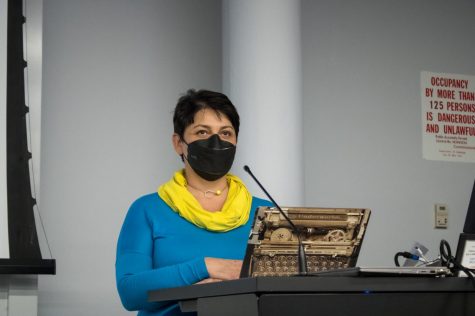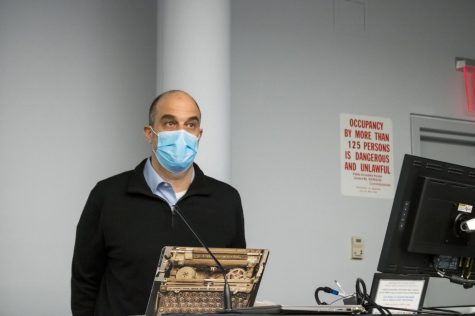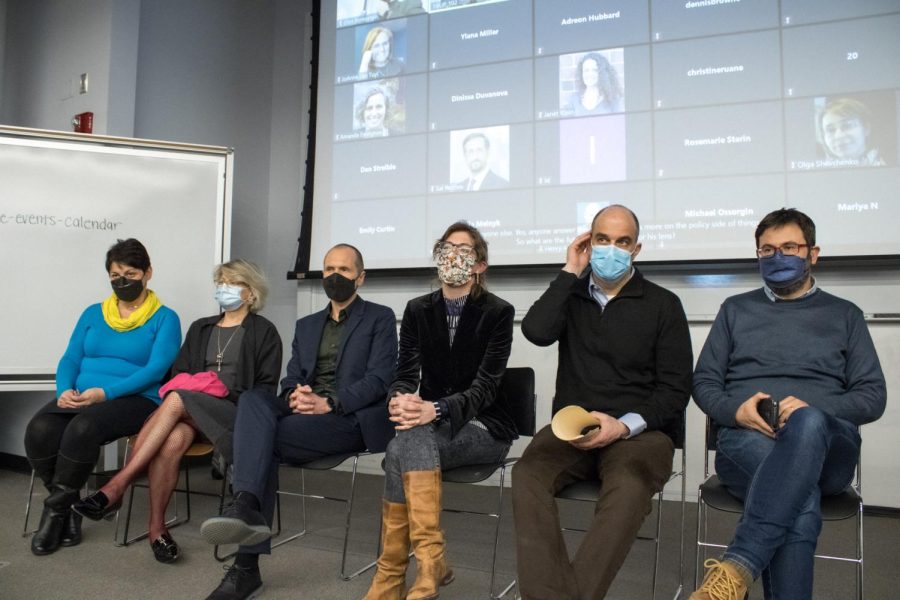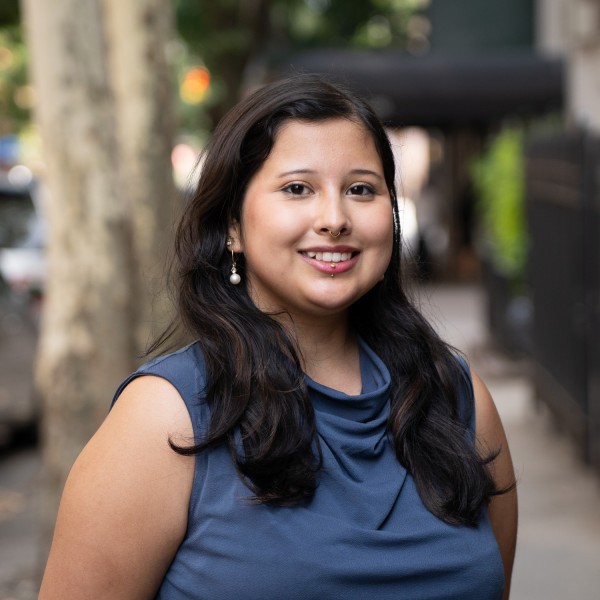7 NYU profs lecture on Russian invasion of Ukraine
The Jordan Center for the Advanced Study of Russia hosted a panel of faculty who offered their personal and academic perspectives on the war in Ukraine.
Seven NYU professors addressed the current state of the Russian invasion of Ukraine at NYU’s Jordan Center for the Advanced Study of Russia on Friday, March 4. (Photo by Gabe Vasconcellos)
March 7, 2022
Around 400 students and faculty members listened to seven NYU professors speak at a teach-in addressing the political context and current state of the Russian invasion of Ukraine. The event was hosted by the NYU Jordan Center for the Advanced Study of Russia on Friday, March 4.
“The reason we are all gathered here is the unprovoked criminal invasion of the independent sovereign country of Ukraine by the armed forces of the Russian Federation,” Eliot Borenstein, a professor of Russian and Slavic studies, said. “We are horrified by the destruction and loss of life in Ukraine.”
Speakers included Natalia Levina, Arturas Rozenas, Joshua Tucker, Eliot Borenstein, Anne O’Donnell, Anne Lounsbery and Rossen Djagalov.
The impact of the invasion on a Ukrainian family
Levina, a Stern professor of information systems, grew up in Kharkiv and showed the audience pictures of crumbling buildings and destruction in the city.
“The bombs that you see fall on the University Square, where I have more memories than I can remember, they fall on the streets where my mom worked,” she said. “They fall in places that have nothing to do with military defenses of Ukraine.”

Levina pointed to an underground subway full of citizens with packed suitcases attempting to shelter from the bombs. She also talked about her three elderly aunts living in the city, who are unable to travel or take shelter in the subway.
“It is not clear to me today that my aunt Leanna will survive,” Levina said. “She’s stuck with no electricity, no internet and no telephone in her apartment. If something happens to them, if today’s non-stop bombing ends up falling on houses, [my aunts] wouldn’t even know what happened to them.”
Levina said humanitarian assistance is necessary for the people of Ukraine and asked the audience to pressure their governments to help.
The censorship of Russian citizens
Rozenas, a CAS associate professor of politics, elaborated on common misconceptions of and assumptions about the Russian-Ukrainian conflict and addressed how Russian President Vladimir Putin’s authoritarianism contributed to the distribution of misinformation about the war around the world.
“What I believe happened is that a lot of bureaucrats, a lot of intelligence services, people simply were reluctant to report information that would go against what they perceive to be Putin’s plan,” Rozenas said. “And they did not report information that would make it look like Russian forces would not be met with cheers and flowers.”
Rossen Djagalov, a CAS assistant professor of Russian and Slavic studies, discussed the impact of the war on Russian citizens, including restrictions on freedom of speech. Djagalov mentioned a law passed on March 4 by the Russian parliament which sentences citizens spreading anti-war information to a 15-year prison term.
Djagalov also questioned Russian opinion polls, which found that the majority of citizens support the war. He noted that less than a quarter of Russians who were approached answered the polls.
“This long tradition to which I fully subscribe to critiquing Russian polls for not reflecting public opinion, distractedly shaped [the answers] and aligned popular sentiment with the state agenda,” Djagalov said.
The potential outcomes of the conflict
Joshua Tucker, the director of the Jordan Center and CAS professor of politics, spoke about the conflict’s potential outcomes, which he claimed are dependent on Putin’s motives. He believes Putin will only end the war if the costs of the conflict will jeopardize his power more than Ukraine remaining an independent country.
Tucker also addressed the possibility that Putin is seeking to secure his legacy as a great Russian leader and reverse the fall of

the Soviet Union — an event that Putin sees as the greatest catastrophe of the 20th century.
“There were a lot of things that Putin did that brought triumphs for Russia or that he could point to triumphantly for Russia — restoring stability after the 1990s, growing the economy, making Russia strong are sort of relevant in global politics,” Tucker said. “Maybe this is what he wants to be his final triumph in this regard, is the restoration of something that looks like the Soviet Union and maybe it’s a union of Russia, Belarus and Ukraine.”
In regards to Putin’s future, Rozenas said the historical precedent for authoritarian rulers could influence his decisions. He said that many dictators who lose office either die, get exiled or go to jail.
“Putin probably understands these thoughts very well, so he’s trapped in a corner,” Rozenas said. “The real issue here is that we are dealing with unchecked power, unconstrained power and the consequences of that unconstrained power. I don’t think it’s about personality — I think it’s about politics.”
Contact Tori Morales at [email protected].

























































































































































